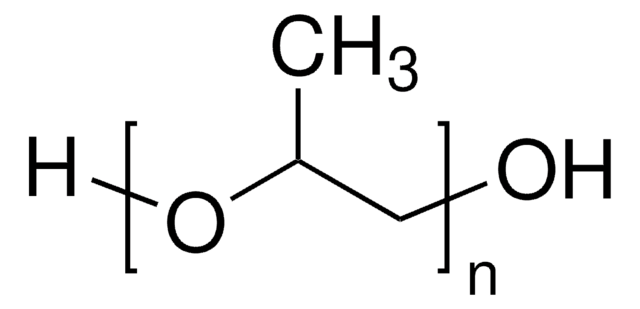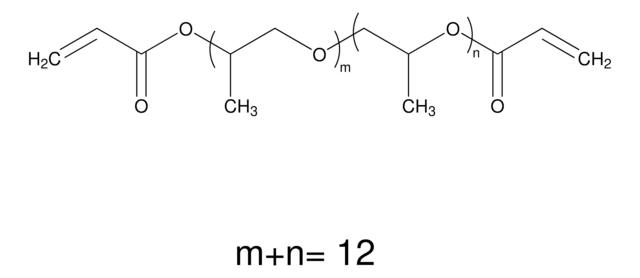81350
Polypropylene glycol
P 400
Sinônimo(s):
1,2-propanediol
Faça loginpara ver os preços organizacionais e de contrato
About This Item
Número CAS:
Número MDL:
Código UNSPSC:
12162002
ID de substância PubChem:
NACRES:
NA.23
Produtos recomendados
Nível de qualidade
forma
liquid
peso molecular
Mn 446
índice de refração
n20/D 1.447
viscosidade
~100 mPa.s(20 °C)
solubilidade
water: miscible (completely)
densidade
1.01 g/mL at 20 °C
InChI
1S/C6H14O3/c1-5(8)4-9-6(2)3-7/h5-8H,3-4H2,1-2H3
chave InChI
DUFKCOQISQKSAV-UHFFFAOYSA-N
Procurando produtos similares? Visita Guia de comparação de produtos
Categorias relacionadas
Descrição geral
Propylene glycol is an aliphatic alcohol. It is an addition polymer of propylene glycol and water represented as H[OCH3]nOH in which n represents the average number of oxypropylene groups.
Aplicação
Propylene glycol (PPG) may be used as a viscosity decreasing agent, a solvent and a fragrance ingredient in cosmetics. PPG may be used as a good swelling agent for the synthesis of large pore mesoporous materials.
Código de classe de armazenamento
10 - Combustible liquids
Classe de risco de água (WGK)
WGK 1
Ponto de fulgor (°F)
201.2 °F - closed cup
Ponto de fulgor (°C)
94.0 °C - closed cup
Equipamento de proteção individual
Eyeshields, Gloves
Escolha uma das versões mais recentes:
Já possui este produto?
Encontre a documentação dos produtos que você adquiriu recentemente na biblioteca de documentos.
Os clientes também visualizaram
Preparation and characterization of organo-modified SBA-15 by using polypropylene glycol as a swelling agent
Park BG, et al.
Microporous and Mesoporous Materials : The Official Journal of the International Zeolite Association, 66(2), 229-238 (2003)
Anup Aggarwal et al.
Cell, 170(2), 249-259 (2017-07-04)
Widespread resistance to first-line TB drugs is a major problem that will likely only be resolved through the development of new drugs with novel mechanisms of action. We have used structure-guided methods to develop a lead molecule that targets the
Mohammed Taghi Zafarani-Moattar et al.
Biotechnology progress, 28(1), 146-156 (2011-09-29)
In this work, we proposed a novel aqueous biphasic system (ABS) composed of polypropylene glycol P400 (PPG P400) and hydrophilic ionic liquids (IL), 1-alkyl-3-methylimidazolium bromide (alkyl = ethyl or butyl), forming an upper polymer-rich phase and a lower IL-rich phase
Celeste R Brennecka et al.
World neurosurgery, 78(5), 469-480 (2011-11-29)
Current treatments for cerebral aneurysms are far from ideal. Platinum coils are prone to compaction, and currently used liquid embolics are delivered with angiotoxic agents. This work presents initial in vivo studies of a novel liquid-to-solid gelling polymer system (PPODA-QT)
John Texter et al.
Macromolecular rapid communications, 33(1), 69-74 (2011-12-03)
The controlled atom transfer radical polymerization of an ionic liquid, 1-(11-acryloylundecyl)-3-methyl imidazolium bromide (ILBr), from both ends of a telechelic poly(propylene oxide) (PPO) macroinitiator, end-functionalized with bromoisobutyryloyl is reported. The resulting highly water-soluble triblock, poly(ILBr-b-PO-b-ILBr) is multistimuli responsive. This new
Nossa equipe de cientistas tem experiência em todas as áreas de pesquisa, incluindo Life Sciences, ciência de materiais, síntese química, cromatografia, química analítica e muitas outras.
Entre em contato com a assistência técnica



